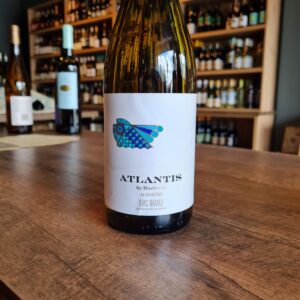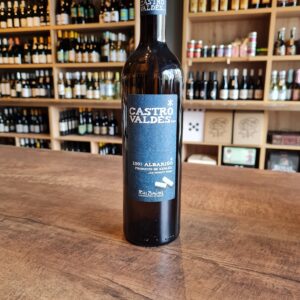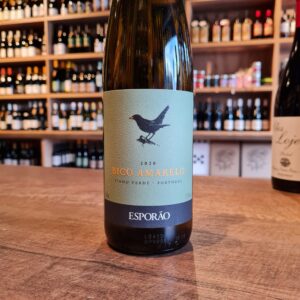-
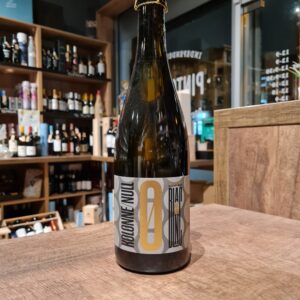 Delicious alcohol-free sparkling wine from Kolonne Null, made in Germany. The Freiherr von Gleichenstein winery has been synonymous with quality, professionalism and passion for almost 400 years. The wines remain recognizable by the distinctive flint minerality of the Kaiserstuhl. Well-coordinated team, complex high-end wines and long-lasting relationships are hallmarks of the South Baden winery culture. Excellent as an aperitif or as an accompaniment to fine canapes, seafood, fresh desserts such as zabaglione and panna cotta with fruits.
Delicious alcohol-free sparkling wine from Kolonne Null, made in Germany. The Freiherr von Gleichenstein winery has been synonymous with quality, professionalism and passion for almost 400 years. The wines remain recognizable by the distinctive flint minerality of the Kaiserstuhl. Well-coordinated team, complex high-end wines and long-lasting relationships are hallmarks of the South Baden winery culture. Excellent as an aperitif or as an accompaniment to fine canapes, seafood, fresh desserts such as zabaglione and panna cotta with fruits. -
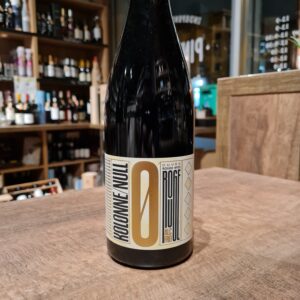 In the middle of the Spanish plateau "Meseta de Ocana" not far from Toledo, three friends founded their own winery in 1999: Margarita Madrigal, Alexandra Schmedes and Gonzalo Rodriguez. The revival of regional traditions became the basis of their way of working, which is characterized by the ecological cultivation of 35 hectares of native grape varieties and the extremely continental climate. Together with Alexandra, the first Spanish red wine, Cuvée Rouge No.2, was developed. This velvety, grippy taste makes it a must-drink on a barbecue evening, with risotto and pasta. The perfect non-alcoholic red wine for all those who love it wild and unbridled. Bring your Spain vacation home!
In the middle of the Spanish plateau "Meseta de Ocana" not far from Toledo, three friends founded their own winery in 1999: Margarita Madrigal, Alexandra Schmedes and Gonzalo Rodriguez. The revival of regional traditions became the basis of their way of working, which is characterized by the ecological cultivation of 35 hectares of native grape varieties and the extremely continental climate. Together with Alexandra, the first Spanish red wine, Cuvée Rouge No.2, was developed. This velvety, grippy taste makes it a must-drink on a barbecue evening, with risotto and pasta. The perfect non-alcoholic red wine for all those who love it wild and unbridled. Bring your Spain vacation home! -
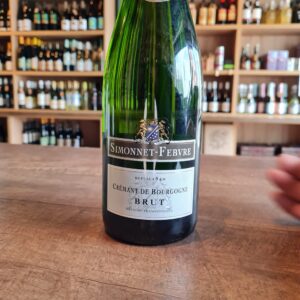 Simmonet-Febvre has been producing its wines with traditional methods since 1840. It is the only Maison in Chablis to produce Crémants of Burgundy. A harmoniously balanced wine with fine bubbles, a persistent foam and a wonderful length in the mouth. It is fresh and powerful on the nose with aromas of citrus. Drink this crémant as a chilled aperitif, as it comes or with a liqueur such as crème de cassis, and why not even drink it throughout a whole meal.
Simmonet-Febvre has been producing its wines with traditional methods since 1840. It is the only Maison in Chablis to produce Crémants of Burgundy. A harmoniously balanced wine with fine bubbles, a persistent foam and a wonderful length in the mouth. It is fresh and powerful on the nose with aromas of citrus. Drink this crémant as a chilled aperitif, as it comes or with a liqueur such as crème de cassis, and why not even drink it throughout a whole meal. -
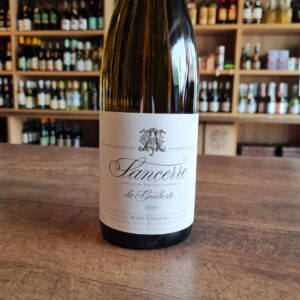 Stone fruit - check! Mineral - check! Floral - check! This wine is definitely ticking off all the right boxes! The minerality of saline and limestone sit on the tip of the tongue and linger through the entire taste. Light bodied, dry, moderate acidity, and a slightly exaggerated finish noted with blanched almonds and lemon rind bring the sip to an end. Time for another! An instant classic from a classic region! The Alain Gueneau Sancerre "La Guiberte" comes from a small family-owned estate at the Eastern end of France's Loire valley. You'll still find the grape's signature citrus freshness and a slight grassiness, but examples from Sancerre lean more towards restraint, minerality, and elegance. The secret is not only in Northern France's cooler climate, but also in the region's soil — a swathe of ancient clay-calcareous deposits that stretches from England's famous white cliffs of Dover across the channel and into Northern France. Alain and daughter Elisa are the 2nd and 3rd-generation of the Gueneau family to farm this land, three quarters of which is planted to Sauvignon Blanc vines with an average age of about 25 years. Enjoy this delicious, refreshing bottle (well chilled, of course!) now or over the next 3 years.
Stone fruit - check! Mineral - check! Floral - check! This wine is definitely ticking off all the right boxes! The minerality of saline and limestone sit on the tip of the tongue and linger through the entire taste. Light bodied, dry, moderate acidity, and a slightly exaggerated finish noted with blanched almonds and lemon rind bring the sip to an end. Time for another! An instant classic from a classic region! The Alain Gueneau Sancerre "La Guiberte" comes from a small family-owned estate at the Eastern end of France's Loire valley. You'll still find the grape's signature citrus freshness and a slight grassiness, but examples from Sancerre lean more towards restraint, minerality, and elegance. The secret is not only in Northern France's cooler climate, but also in the region's soil — a swathe of ancient clay-calcareous deposits that stretches from England's famous white cliffs of Dover across the channel and into Northern France. Alain and daughter Elisa are the 2nd and 3rd-generation of the Gueneau family to farm this land, three quarters of which is planted to Sauvignon Blanc vines with an average age of about 25 years. Enjoy this delicious, refreshing bottle (well chilled, of course!) now or over the next 3 years. -
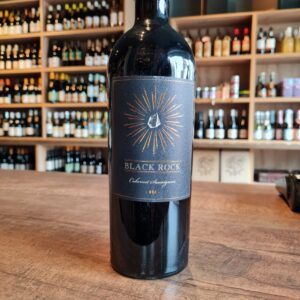 Black Rock is part of the Bronco Wine Company, which was formed in 1973 by Fred, Joseph and John Franzia. Since the start, they have been clear that the goal is to make wines for consumption, rather than for storage. At the same time, the quality must be as high as possible, at the lowest possible price. The name Bronco is a merger of brother and cousin after the brothers Fred and Joseph and their cousin John. Great aromas of red berries and fruit, with a touch of herbaceousness. Full-bodied, with healthy fruit tones, well-balanced tannins and a subtle hint of oak. Serve around 16-18 ° C as a perfect complement to grilled lamb chops, or to dishes on game or beef. Also nice for a cheese platter, with not too strong cheeses.
Black Rock is part of the Bronco Wine Company, which was formed in 1973 by Fred, Joseph and John Franzia. Since the start, they have been clear that the goal is to make wines for consumption, rather than for storage. At the same time, the quality must be as high as possible, at the lowest possible price. The name Bronco is a merger of brother and cousin after the brothers Fred and Joseph and their cousin John. Great aromas of red berries and fruit, with a touch of herbaceousness. Full-bodied, with healthy fruit tones, well-balanced tannins and a subtle hint of oak. Serve around 16-18 ° C as a perfect complement to grilled lamb chops, or to dishes on game or beef. Also nice for a cheese platter, with not too strong cheeses. -
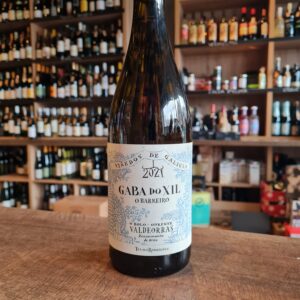 This slinky, mineral white hails from Valdeorras (“Valley of Gold”) in eastern Galicia, a region once famous for goldmining and now best known for its unique and complex wines made from the indigenous Godello grape. The wine is named for the river Sil that flows through the region (Xil is its ancient name, used by the Celtic people who once inhabited the area). Many of the river’s tributaries are flanked on either side by vineyards, planted in terraces on steep slate hillsides. The label displays a dozen bridges, symbolizing the idea of crossing from one vineyard plot to another. Gaba do Xil Godello is produced partially from grapes that are partially estate-grown and partially sourced from long-term suppliers. They come from 4 plots (O Val Grande, O Rasedo, A Torgueira, and O Valverde) located near the Bibei tributary, close to the town of Santa Cruz. Dotted with chestnut trees mixed with rockrose, the old granitic terraces barely have enough space to squeeze in the odd row of vines, following the folds of the mountains that plunge into the river. The vines grow in shallow, stony granite soils on terraces facing south, west and northwest. These coarse soils are low fertility and have low water retention capacity, forcing the vines to struggle and limiting yields. This Godello, is unoaked, gentle, restrained and precise which is dry and soft with a touch of godello's distinctive minerally citrus fruit, absoloutly perfect with light sea food dishes. Excellent value
This slinky, mineral white hails from Valdeorras (“Valley of Gold”) in eastern Galicia, a region once famous for goldmining and now best known for its unique and complex wines made from the indigenous Godello grape. The wine is named for the river Sil that flows through the region (Xil is its ancient name, used by the Celtic people who once inhabited the area). Many of the river’s tributaries are flanked on either side by vineyards, planted in terraces on steep slate hillsides. The label displays a dozen bridges, symbolizing the idea of crossing from one vineyard plot to another. Gaba do Xil Godello is produced partially from grapes that are partially estate-grown and partially sourced from long-term suppliers. They come from 4 plots (O Val Grande, O Rasedo, A Torgueira, and O Valverde) located near the Bibei tributary, close to the town of Santa Cruz. Dotted with chestnut trees mixed with rockrose, the old granitic terraces barely have enough space to squeeze in the odd row of vines, following the folds of the mountains that plunge into the river. The vines grow in shallow, stony granite soils on terraces facing south, west and northwest. These coarse soils are low fertility and have low water retention capacity, forcing the vines to struggle and limiting yields. This Godello, is unoaked, gentle, restrained and precise which is dry and soft with a touch of godello's distinctive minerally citrus fruit, absoloutly perfect with light sea food dishes. Excellent value -
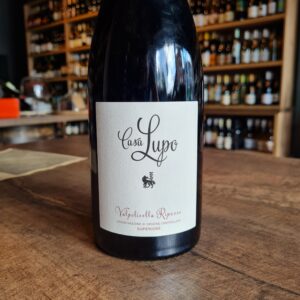 Great Ripasso wine here, any wine enthusiasts will see it as an honest to the point wine on it's Ripasso process. Otherwise known as a ‘Baby Amarone’. The term “Ripasso” means “repassed” referring to the production process whereby regular, fermented Valpolicella (which is a blend of three regional native red grape varieties – Corvina, Rondinella and occasionally Molinara) is added to a cask containing the skins and lees left over from recently fermented Amarone wines. The process of adding (or “repassing”) the lighter Valpolicella wine over the remainders of the “bigger” Amarone wine imparts additional color, texture and flavor to the Valpolicella wine. The “Appassimento” process is an ancient wine making technique used in Northern Italy to make Amarone – the Daddy of Italian wine and its by product Recioto della Valpolicella (a sweet red wine). Grapes are air dried on racks for a period of at least a couple of months and often as many as six, before being pressed. Also, it induces a second fermentation of the wine that increases the wine’s alcoholic content. The end result is a wine that retains the vibrancy of Valpolicella but is darker in colour, bigger and more flavourful and complex than the original Valpolicella. Ripasso wines are rich, full-bodied and share some of the same aroma and flavor profiles as Amarone wines, just less so. Since Ripasso wines are more approachable and less expensive than Amarones they can be enjoyed more regularly. The land is at an altitude of 450 meters above the see level and the soil is made by the alteration of calcareous-fossilized formations, in particular the red flake and biancone marble.After harvesting by hand, the Valpolicella, before aging, is macerated a second time on the mark of the Amarone just drawn and left to rest for about 15-20 days. Then a maturation in oak barrels of 500/1000 LT for 18 months takes place. Ageing in bottles follows that lasts until optimal maturity. It matches perfectly with mushroom risotto, red meat such as barbecue steak or white meat such as stewed rabbit, perfect with cheese of medium maturing.
Great Ripasso wine here, any wine enthusiasts will see it as an honest to the point wine on it's Ripasso process. Otherwise known as a ‘Baby Amarone’. The term “Ripasso” means “repassed” referring to the production process whereby regular, fermented Valpolicella (which is a blend of three regional native red grape varieties – Corvina, Rondinella and occasionally Molinara) is added to a cask containing the skins and lees left over from recently fermented Amarone wines. The process of adding (or “repassing”) the lighter Valpolicella wine over the remainders of the “bigger” Amarone wine imparts additional color, texture and flavor to the Valpolicella wine. The “Appassimento” process is an ancient wine making technique used in Northern Italy to make Amarone – the Daddy of Italian wine and its by product Recioto della Valpolicella (a sweet red wine). Grapes are air dried on racks for a period of at least a couple of months and often as many as six, before being pressed. Also, it induces a second fermentation of the wine that increases the wine’s alcoholic content. The end result is a wine that retains the vibrancy of Valpolicella but is darker in colour, bigger and more flavourful and complex than the original Valpolicella. Ripasso wines are rich, full-bodied and share some of the same aroma and flavor profiles as Amarone wines, just less so. Since Ripasso wines are more approachable and less expensive than Amarones they can be enjoyed more regularly. The land is at an altitude of 450 meters above the see level and the soil is made by the alteration of calcareous-fossilized formations, in particular the red flake and biancone marble.After harvesting by hand, the Valpolicella, before aging, is macerated a second time on the mark of the Amarone just drawn and left to rest for about 15-20 days. Then a maturation in oak barrels of 500/1000 LT for 18 months takes place. Ageing in bottles follows that lasts until optimal maturity. It matches perfectly with mushroom risotto, red meat such as barbecue steak or white meat such as stewed rabbit, perfect with cheese of medium maturing. -
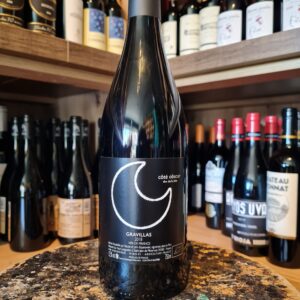 A typical blend of almost century-old Carignan and Cabernet Sauvignon. The vineyard is treated with respect, neither chemicals nor weed killers are tolerated, in order to preserve the biodiversity of the surrounding flora and fauna. The favourable terroir of white limestone pebbles, combined with low yields, gives mineral wines, with a beautiful freshness , and concentrated fruit. Manual harvest in 15 kg crates with severe sorting in the vineyard. 3 weeks pellicular maceration which brings a lot of fullness. We will find the aromatic complexity of Carignan with some notes of pepper and a tannic structure provided by the Cabernet. the tannins are nevertheless very fine. Pair this Coté Obscur wine with beef entrecote, duck skewer and some soft cheese. A real treat! Would recommend to decant this for at least an hour.
A typical blend of almost century-old Carignan and Cabernet Sauvignon. The vineyard is treated with respect, neither chemicals nor weed killers are tolerated, in order to preserve the biodiversity of the surrounding flora and fauna. The favourable terroir of white limestone pebbles, combined with low yields, gives mineral wines, with a beautiful freshness , and concentrated fruit. Manual harvest in 15 kg crates with severe sorting in the vineyard. 3 weeks pellicular maceration which brings a lot of fullness. We will find the aromatic complexity of Carignan with some notes of pepper and a tannic structure provided by the Cabernet. the tannins are nevertheless very fine. Pair this Coté Obscur wine with beef entrecote, duck skewer and some soft cheese. A real treat! Would recommend to decant this for at least an hour. -
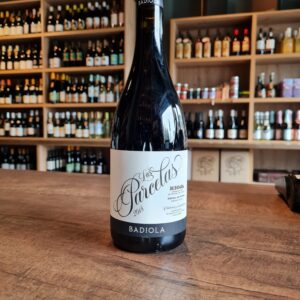 Bodega Badiola, was founded in 2018, part of the Peninsula Vinicultore Group when they bought an old company in the in Rioja Alavesa, the Basque region in the east and south east of Rioja. Their vineyards are situated on the slopes of the Sierra Cantabria, mostly tiny parcels the average size being only 0.3 hectares with an average vine age of 50 years but some of the vines are obviously significantly older. With respect for the environment, minimal spraying of copper and sulphur only are used, so all but Organic. The Las Parcelas comes from 300 carefully selected parcels of old bush Tempranillo vines planted in limestone soils, resulting in elegant wines that are fresh and age worthy due to the balancing acidity. The winemaking philosophy is to keep that purity and freshness by careful use of oak, giving a real point of difference to the traditional oaky Riojas. On the nose and palate, the fruit is very much to the fore with cherry and blackberry fruit with hints of spice and with fresh acidity and almost chalky tannins from that limestone soils. Though it is still young give it some air and it really blossoms, drinking significantly better at dinner rather than lunch when first opened, so will keep well too.
Bodega Badiola, was founded in 2018, part of the Peninsula Vinicultore Group when they bought an old company in the in Rioja Alavesa, the Basque region in the east and south east of Rioja. Their vineyards are situated on the slopes of the Sierra Cantabria, mostly tiny parcels the average size being only 0.3 hectares with an average vine age of 50 years but some of the vines are obviously significantly older. With respect for the environment, minimal spraying of copper and sulphur only are used, so all but Organic. The Las Parcelas comes from 300 carefully selected parcels of old bush Tempranillo vines planted in limestone soils, resulting in elegant wines that are fresh and age worthy due to the balancing acidity. The winemaking philosophy is to keep that purity and freshness by careful use of oak, giving a real point of difference to the traditional oaky Riojas. On the nose and palate, the fruit is very much to the fore with cherry and blackberry fruit with hints of spice and with fresh acidity and almost chalky tannins from that limestone soils. Though it is still young give it some air and it really blossoms, drinking significantly better at dinner rather than lunch when first opened, so will keep well too. -
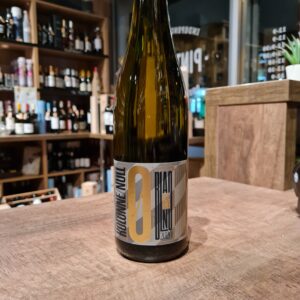 With admirable precision and innovative ideas, the family-run winery Pauly, now in its 3rd generation, succeeds in producing stylish wines with an outstanding character of their own. The winery is not only known for its famous steep slope on the Niederberg-Helden on the Mosel River, but also for the unique slate minerality that gives the wines an elegant, fresh style. The alcohol-free Riesling from Kolonne Null is perfect for all wine enthusiasts who like as little residual sweetness in their wine as possible. Best enjoyed very well chilled at 5 - 7°C. It is perfect as an accompaniment to stir-fried vegetables with fish, omelette with salmon and fennel or vegetable salad with beetroot.
With admirable precision and innovative ideas, the family-run winery Pauly, now in its 3rd generation, succeeds in producing stylish wines with an outstanding character of their own. The winery is not only known for its famous steep slope on the Niederberg-Helden on the Mosel River, but also for the unique slate minerality that gives the wines an elegant, fresh style. The alcohol-free Riesling from Kolonne Null is perfect for all wine enthusiasts who like as little residual sweetness in their wine as possible. Best enjoyed very well chilled at 5 - 7°C. It is perfect as an accompaniment to stir-fried vegetables with fish, omelette with salmon and fennel or vegetable salad with beetroot. -
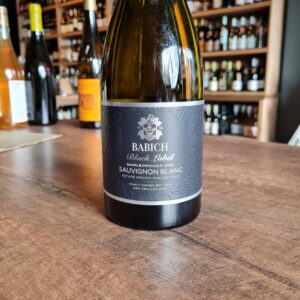 The Babich family hails from Croatia and first bought land in New Zealand in 1916. The winery is now in its third generation. Fruit for this wine comes from a variety of its estate-owned vineyards which are sustainable or organic. Most of the juice for this wine is fermented in stainless steel with a small percentage in old oak. Crafted with food in mind-weighty, ripe, tropical fruit, flavoured style, rich and rounded. Pair it with veal, seafood (oysters) or a chicken dish.
The Babich family hails from Croatia and first bought land in New Zealand in 1916. The winery is now in its third generation. Fruit for this wine comes from a variety of its estate-owned vineyards which are sustainable or organic. Most of the juice for this wine is fermented in stainless steel with a small percentage in old oak. Crafted with food in mind-weighty, ripe, tropical fruit, flavoured style, rich and rounded. Pair it with veal, seafood (oysters) or a chicken dish. -
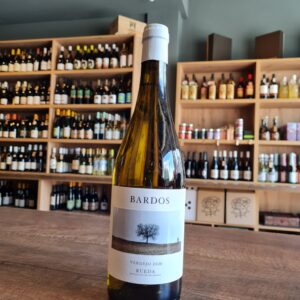 Bardos Verdejo is a wine made from 100% Verdejo from vineyards that are 20-25 years old, located in Rueda, at more than 700 metres of altitude on stony soils. The harvest is carried out at night, at temperatures below 15ºC. The fermentation is done with local yeasts at a controlled temperature and the wine rests on its lees for at least 4 months, gaining complexity and texture. On the nose, the intense aromas of fruit such as white peach combine with cut grass, citrus, balsamic and mineral notes. In the mouth it has a good volume and persistence, well integrated acidity and a characteristic aniseed aftertaste, typical of the grape. Really a high quality example of this native Spanish variety. Excellent with light bites, starters, salads and white fish. All of the wines by De Bardos are crafted by hand in a fully artisan manner.
Bardos Verdejo is a wine made from 100% Verdejo from vineyards that are 20-25 years old, located in Rueda, at more than 700 metres of altitude on stony soils. The harvest is carried out at night, at temperatures below 15ºC. The fermentation is done with local yeasts at a controlled temperature and the wine rests on its lees for at least 4 months, gaining complexity and texture. On the nose, the intense aromas of fruit such as white peach combine with cut grass, citrus, balsamic and mineral notes. In the mouth it has a good volume and persistence, well integrated acidity and a characteristic aniseed aftertaste, typical of the grape. Really a high quality example of this native Spanish variety. Excellent with light bites, starters, salads and white fish. All of the wines by De Bardos are crafted by hand in a fully artisan manner. -
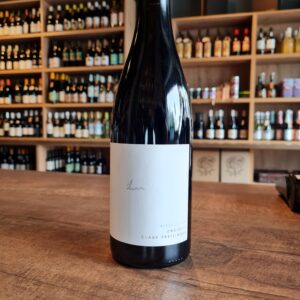 Claus Preisinger has honed his skills around the world, working in vineyards in California, before returning to his Austrian roots to work for Anita and Hans Nittnaus. After branching out on his own, he has kept the respectful and honest winemaking he learned there, and is applying it a stone's throw away in the town of Gols. His "Kieselstein" Zweigelt is one of the most immediately enjoyable wines that I have had the opportunity to drink as of late. This beautifully pure Zweigelt was fermented in neutral barrels with a touch of sulphur added at bottling. Claus Preisinger has been using ambient yeasts since 2002 as well as little to no sulfites. The Preisinger wines are certified biodynamic, which Claus takes very seriously. His commitment to the environment and non-interventional winemaking shines through in the superior wines he produces. Super fresh and juicy. Can be served chilled.
Claus Preisinger has honed his skills around the world, working in vineyards in California, before returning to his Austrian roots to work for Anita and Hans Nittnaus. After branching out on his own, he has kept the respectful and honest winemaking he learned there, and is applying it a stone's throw away in the town of Gols. His "Kieselstein" Zweigelt is one of the most immediately enjoyable wines that I have had the opportunity to drink as of late. This beautifully pure Zweigelt was fermented in neutral barrels with a touch of sulphur added at bottling. Claus Preisinger has been using ambient yeasts since 2002 as well as little to no sulfites. The Preisinger wines are certified biodynamic, which Claus takes very seriously. His commitment to the environment and non-interventional winemaking shines through in the superior wines he produces. Super fresh and juicy. Can be served chilled. -
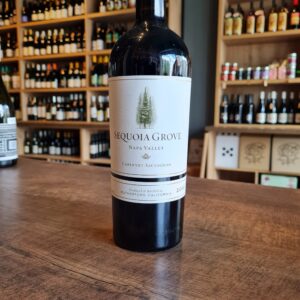 Family-owned winery Sequoia Grove was founded in 1979 in a 110-year old barn beneath a grove of Sequoia trees in Rutherford. Michael Trujillo joined the winery as assistant winemaker in 1981, becoming director of winemaking in 2002. His philosophy is based on balance in the vineyard, planting different blocks with different clones, and farming without pesticides. The family have been working with their partner growers for decades which gives them access to the very best quality fruit each year and allows them to create this complex wine which truly expresses the Rutherford terroir. The young wine is aged in oak barrel for 20 months which adds sweet spice notes and extra complexity to the finished bottling. The rich, powerful flavor profile makes this a winner with lovers of big, bold reds and a great match for red meats. Drink now through to 2030. Decanting is always recommended but is not a must
Family-owned winery Sequoia Grove was founded in 1979 in a 110-year old barn beneath a grove of Sequoia trees in Rutherford. Michael Trujillo joined the winery as assistant winemaker in 1981, becoming director of winemaking in 2002. His philosophy is based on balance in the vineyard, planting different blocks with different clones, and farming without pesticides. The family have been working with their partner growers for decades which gives them access to the very best quality fruit each year and allows them to create this complex wine which truly expresses the Rutherford terroir. The young wine is aged in oak barrel for 20 months which adds sweet spice notes and extra complexity to the finished bottling. The rich, powerful flavor profile makes this a winner with lovers of big, bold reds and a great match for red meats. Drink now through to 2030. Decanting is always recommended but is not a must -
Out of stock
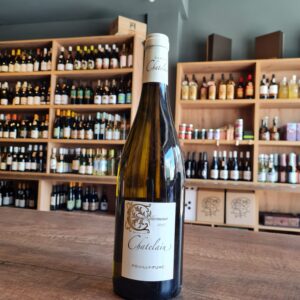 The Chatelain family has worked the vineyards of Pouilly-sur-Loire since the 1630s. Today the family farm is run by Jean-Claude and Geneviève Chatelain, the 11th generation of winemakers from Domaine Chatelain. The grapes for Les Chailloux are grown on the St. Andelain Hill with its clay and siliceous soils strewn with pebbles and flint; the wine is aged ‘sur lie’ prior to bottling in the spring. Light yellow-gold; the wine is vivid, aromatic and minerally on the nose, followed by a spicy flint (silex) character on the palate.
The Chatelain family has worked the vineyards of Pouilly-sur-Loire since the 1630s. Today the family farm is run by Jean-Claude and Geneviève Chatelain, the 11th generation of winemakers from Domaine Chatelain. The grapes for Les Chailloux are grown on the St. Andelain Hill with its clay and siliceous soils strewn with pebbles and flint; the wine is aged ‘sur lie’ prior to bottling in the spring. Light yellow-gold; the wine is vivid, aromatic and minerally on the nose, followed by a spicy flint (silex) character on the palate. -
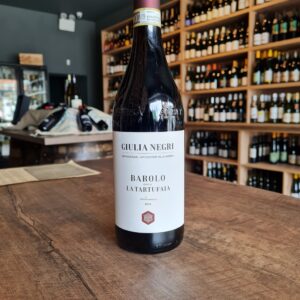 Giulia Negri is a young talent that goes by the nickname "Barolo girl" in the wine world. The grapes for this archetype of a modern-traditional Barolo come from the top vineyards Brunate and Serradenari, the latter is located at an altitude of up to 520 m, and the soils are clayey-sandy. It is an area with a particularly cool and breezy microclimate, which is reflected in the elegant profile of the wines. Climbing towards the top of the hill, the soils become increasingly rich in sandy veins and limestone marl, which contribute to giving Barolo an extreme expressive refinement. The high quality grapes, a work in the cellar that is very respectful of the raw material and aimed at enhancing the typical characteristics of the terroir, allow the creation of a Barolo faithful to the land of origin. Dressed to impress, savory red with a fine fragrance on the palate that doesn't deny its origin and the grape variety, it is of an almost unique elegance and freshness that allows it to be identified as a lively and completely complete top wine even when young. Further years of maturity are certainly not a mistake, because one feels impressively how the complexity increasing with the age joins the finesse and elegance already unmistakable today. One bottle for now and don't put the rest too far away in the cellar, please!
Giulia Negri is a young talent that goes by the nickname "Barolo girl" in the wine world. The grapes for this archetype of a modern-traditional Barolo come from the top vineyards Brunate and Serradenari, the latter is located at an altitude of up to 520 m, and the soils are clayey-sandy. It is an area with a particularly cool and breezy microclimate, which is reflected in the elegant profile of the wines. Climbing towards the top of the hill, the soils become increasingly rich in sandy veins and limestone marl, which contribute to giving Barolo an extreme expressive refinement. The high quality grapes, a work in the cellar that is very respectful of the raw material and aimed at enhancing the typical characteristics of the terroir, allow the creation of a Barolo faithful to the land of origin. Dressed to impress, savory red with a fine fragrance on the palate that doesn't deny its origin and the grape variety, it is of an almost unique elegance and freshness that allows it to be identified as a lively and completely complete top wine even when young. Further years of maturity are certainly not a mistake, because one feels impressively how the complexity increasing with the age joins the finesse and elegance already unmistakable today. One bottle for now and don't put the rest too far away in the cellar, please! -
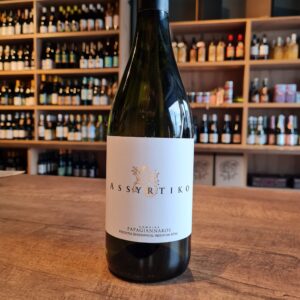 Founded in 1919, Domaine Papagiannakos is located in the Attica region of Central Greece, just 18 miles from Athens. Today, the winery is run by the 3rd generation, Vassilis Papagiannakos, who has issued a new era of modern winemaking while still maintaining the family’s dedication to cultivating and preserving the region’s most famous indigenous grape, Savatiano. In addition the Domaine has plant Malagousia and Assyrtiko. The Assyrtiko vineyards are located in northeastern Attica at an altitude of 330 feet. The vineyard has a northeastern facing exposure. The vineyard is farmed without irrigation, resulting in low-yielding vines that produce grapes with rich, concentrated fruit flavors. The limestone soil and the unique microclimate of the region produces wine with a very clean and crisp profile with citrus and white flesh aromas.The acidity is very well integrated into the wine and gives the ability for long aging. With aging the wine develops a beautiful mineral character. The refreshing character of the wine makes it an ideal accompaniment for seafood, fish, white meat, and Mediterranean cuisine.
Founded in 1919, Domaine Papagiannakos is located in the Attica region of Central Greece, just 18 miles from Athens. Today, the winery is run by the 3rd generation, Vassilis Papagiannakos, who has issued a new era of modern winemaking while still maintaining the family’s dedication to cultivating and preserving the region’s most famous indigenous grape, Savatiano. In addition the Domaine has plant Malagousia and Assyrtiko. The Assyrtiko vineyards are located in northeastern Attica at an altitude of 330 feet. The vineyard has a northeastern facing exposure. The vineyard is farmed without irrigation, resulting in low-yielding vines that produce grapes with rich, concentrated fruit flavors. The limestone soil and the unique microclimate of the region produces wine with a very clean and crisp profile with citrus and white flesh aromas.The acidity is very well integrated into the wine and gives the ability for long aging. With aging the wine develops a beautiful mineral character. The refreshing character of the wine makes it an ideal accompaniment for seafood, fish, white meat, and Mediterranean cuisine. -
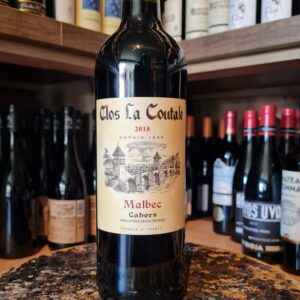 Malbec is the main grape in the legendary ‘Black wine of Cahors’. Way before Argentina made the varietal ‘famous’, Malbec – though in this region it is known as Côt or Auxerrois. – was making long-lived wines from Cahors – the 1959 Clos La Coutale is still drinking superbly. Clos La Coutale is a benchmark of the Cahors region and has a history of producing some of the finest and longest-lived wines of the region. Blackcurrants, blackberry's and prune notes followed by a soft and elegant palate that has an enticing note of vanilla. This Clos La Coutale wine is matured in barrels and wooden casks for one year in order to obtain a good balance between tannins and fruit. Organic and true gem at this price point.
Malbec is the main grape in the legendary ‘Black wine of Cahors’. Way before Argentina made the varietal ‘famous’, Malbec – though in this region it is known as Côt or Auxerrois. – was making long-lived wines from Cahors – the 1959 Clos La Coutale is still drinking superbly. Clos La Coutale is a benchmark of the Cahors region and has a history of producing some of the finest and longest-lived wines of the region. Blackcurrants, blackberry's and prune notes followed by a soft and elegant palate that has an enticing note of vanilla. This Clos La Coutale wine is matured in barrels and wooden casks for one year in order to obtain a good balance between tannins and fruit. Organic and true gem at this price point. -
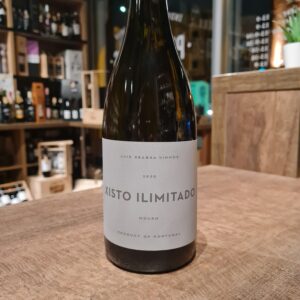 Another under the radar Portuguese White. This drop is now considered one of the new best contemporanean whites in Portugal. Produced by Luis Seabra, who worked for more than 10 years as an oenologist for Dirk Niepoort and finally started to follow his own path in 2012. The name he gives to his wines is indicative of his vision of wine: Xisto (Schist). He makes very pure wines that reflect their terroir. Luis Seabra sets a new standard in the Douro with his pure wines. Xisto Ilimitado, is a Portuguese analogue of the idea of a "village-level" Burgundy. A blend of six varieties planted in three sub-areas of the Douro, Ilimitado is a glimpse of the appellation's schist soil. Luis Seabra, has concentrated his production on the different soil types of the valley. Bright, concentrated and fresh, Xisto Ilimitado is an excellent introduction to the new Douro. Vineyards located in Cima Corgo. The vines are between 30 and 45 years old, planted in micaceous schist at an altitude of 500 to 600 m, and are a sub-region that experiences extreme highs and lows in terms of temperature, with one of the largest day-night temperature deltas in Portugal. As such, the fruit experiences an extended resting period. Annual rainfall of 400 mm typical of the region. Goes wonderfully with roasted poultry, white fish and seafood, and especially with the spiciest preparations
Another under the radar Portuguese White. This drop is now considered one of the new best contemporanean whites in Portugal. Produced by Luis Seabra, who worked for more than 10 years as an oenologist for Dirk Niepoort and finally started to follow his own path in 2012. The name he gives to his wines is indicative of his vision of wine: Xisto (Schist). He makes very pure wines that reflect their terroir. Luis Seabra sets a new standard in the Douro with his pure wines. Xisto Ilimitado, is a Portuguese analogue of the idea of a "village-level" Burgundy. A blend of six varieties planted in three sub-areas of the Douro, Ilimitado is a glimpse of the appellation's schist soil. Luis Seabra, has concentrated his production on the different soil types of the valley. Bright, concentrated and fresh, Xisto Ilimitado is an excellent introduction to the new Douro. Vineyards located in Cima Corgo. The vines are between 30 and 45 years old, planted in micaceous schist at an altitude of 500 to 600 m, and are a sub-region that experiences extreme highs and lows in terms of temperature, with one of the largest day-night temperature deltas in Portugal. As such, the fruit experiences an extended resting period. Annual rainfall of 400 mm typical of the region. Goes wonderfully with roasted poultry, white fish and seafood, and especially with the spiciest preparations -
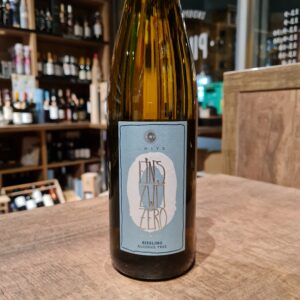 Johannes Leitz continues to innovate! In doing so, he recently partnered with a company to produce two alcohol-free rieslings. Germans have been producing non-alcoholic wines for over 70 years and that history has led to inventions to improve quality. Leitz’s hometown of Rüdesheim is the historic birthplace of the famous distillery Asbach Uralt. After the war, a fellow vigneron named Carl Jung began a distillery. Ultimately, Jung could not compete with the local brandy, but he developed a vacuum distillation system which enabled him to lower the temperature at which alcohol could boil off (because the boiling point decreases as atmospheric pressure decreases). Innovations in vacuum distillation have improved in recent years, and Leitz found a producer in Rheinhessen who recently patented a new, completely closed system that allows wine alcohol to boil at 28°C, preserving “wine-like” aromas and characteristics. As we all know, like fat, alcohol is a transporter of flavor, and without it, there needs to be something else to carry those flavors. 35 grams/L does the work for this riesling, though the sugar is nearly eaten up. Pairs well with gratinated crostini, cauliflower and goat’s cheese & butter, as well as with an Asian chicken casserole.
Johannes Leitz continues to innovate! In doing so, he recently partnered with a company to produce two alcohol-free rieslings. Germans have been producing non-alcoholic wines for over 70 years and that history has led to inventions to improve quality. Leitz’s hometown of Rüdesheim is the historic birthplace of the famous distillery Asbach Uralt. After the war, a fellow vigneron named Carl Jung began a distillery. Ultimately, Jung could not compete with the local brandy, but he developed a vacuum distillation system which enabled him to lower the temperature at which alcohol could boil off (because the boiling point decreases as atmospheric pressure decreases). Innovations in vacuum distillation have improved in recent years, and Leitz found a producer in Rheinhessen who recently patented a new, completely closed system that allows wine alcohol to boil at 28°C, preserving “wine-like” aromas and characteristics. As we all know, like fat, alcohol is a transporter of flavor, and without it, there needs to be something else to carry those flavors. 35 grams/L does the work for this riesling, though the sugar is nearly eaten up. Pairs well with gratinated crostini, cauliflower and goat’s cheese & butter, as well as with an Asian chicken casserole. -
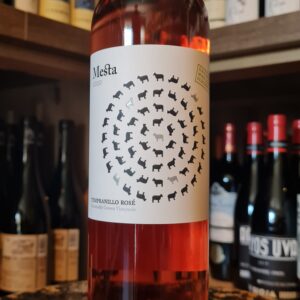 Mesta is a range of organically and sustainably grown single varietal wines, which stylishly showcase the Spanish wine revolution under the symbol of the Mesta. Mesta was a powerful alliance of sheep ranchers in medieval Castile, who controlled the cañadas: the traditional rights of way for migrating sheep. To this day the cañadas are protected from being blocked or built upon, a reminder of ancient rights and a model of coexistence with nature. This modern range, from the fashionable DO Uclés in central Castile, offers wines of great purity and varietal typicity.A versatile wine which accompanies spicy dishes perfectly, Asian curries, seafood risotto or a light salad with grilled prawns. Rosé wines are in fashion not just in the summer but also throughout the year, and this beautiful Mesta Rosé is a serious contender in the Rosé world. Especially at this price!!!
Mesta is a range of organically and sustainably grown single varietal wines, which stylishly showcase the Spanish wine revolution under the symbol of the Mesta. Mesta was a powerful alliance of sheep ranchers in medieval Castile, who controlled the cañadas: the traditional rights of way for migrating sheep. To this day the cañadas are protected from being blocked or built upon, a reminder of ancient rights and a model of coexistence with nature. This modern range, from the fashionable DO Uclés in central Castile, offers wines of great purity and varietal typicity.A versatile wine which accompanies spicy dishes perfectly, Asian curries, seafood risotto or a light salad with grilled prawns. Rosé wines are in fashion not just in the summer but also throughout the year, and this beautiful Mesta Rosé is a serious contender in the Rosé world. Especially at this price!!!


